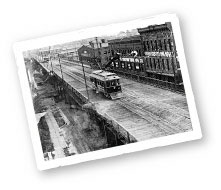Denver History
Denver City was founded in November 1858 as a mining  town during the Pikes Peak Gold Rush in western Kansas Territory. That summer, a group of gold prospectors from Lawrence, Kansas, arrived and established Montana City on the banks of the South Platte River. This was the first settlement in what was later to become the city of Denver. The site faded quickly, however, and was abandoned in favor of Auraria and St. Charles City by the summer of 1859. The Montana City site is now Grant-Frontier Park and includes mining equipment and a log cabin replica.
town during the Pikes Peak Gold Rush in western Kansas Territory. That summer, a group of gold prospectors from Lawrence, Kansas, arrived and established Montana City on the banks of the South Platte River. This was the first settlement in what was later to become the city of Denver. The site faded quickly, however, and was abandoned in favor of Auraria and St. Charles City by the summer of 1859. The Montana City site is now Grant-Frontier Park and includes mining equipment and a log cabin replica.
On November 22, 1858, General William Larimer, a land speculator from eastern Kansas, placed cottonwood logs to stake a claim on the hill overlooking the confluence of the South Platte River and Cherry Creek, across the creek from the existing mining settlement of Auraria. Larimer named the town site Denver City to curry favor with Kansas Territorial Governor James W. Denver. Larimer hoped that the town’s name would help make it the county seat of Arapaho County, but unknown to him Governor Denver had already resigned from office. The location was accessible to existing trails and was across the South Platte River from the site of seasonal encampments of the Cheyenne and Arapaho. The site of these first towns is now the site of Confluence Park in downtown Denver. Larimer, along with associates in the St. Charles City Land Company, sold parcels in the town to merchants and miners, with the intention of creating a major city that would cater to new emigrants. Denver City was a frontier town, with an economy based on servicing local miners with gambling, saloons, livestock and goods trading. In the early years, land parcels were often traded for grubstakes or gambled away by miners in Auraria.
Colorado Territory was created on February 28, 1861, Arapahoe County was formed on November 1, 1861, and Denver City was incorporated on November 7, 1861. Denver City served as the Arapahoe County Seat from 1861 until consolidation in 1902. In 1865, Denver City became the Territorial Capital. With its new-found importance, Denver City shortened its name to just Denver. On August 1, 1876, Denver became the State Capital when Colorado was admitted to the Union.
Between 1880-1895 the city experienced a huge rise in city  corruption, as crime bosses, such as Soapy Smith, worked side-by-side with elected officials and the police to control the elections, gambling, and the bunko gangs. In 1887, the precursor to the international charity United Way was formed in Denver by local religious leaders who raised funds and coordinated various charities to help Denver’s poor. By 1890, Denver had grown to be the second largest city west of Omaha, but by 1900 it had dropped to third place behind San Francisco and Los Angeles.
corruption, as crime bosses, such as Soapy Smith, worked side-by-side with elected officials and the police to control the elections, gambling, and the bunko gangs. In 1887, the precursor to the international charity United Way was formed in Denver by local religious leaders who raised funds and coordinated various charities to help Denver’s poor. By 1890, Denver had grown to be the second largest city west of Omaha, but by 1900 it had dropped to third place behind San Francisco and Los Angeles.
In 1901 the Colorado General Assembly voted to split Arapahoe County into three parts: a new consolidated City and County of Denver, a new Adams County, and the remainder of the Arapahoe County to be renamed South Arapahoe County. A ruling by the Colorado Supreme Court, subsequent legislation, and a referendum delayed the creation of the City and County of Denver until November 15, 1902.
Denver has hosted the Democratic National Convention twice, during the years of 1908, and again in 2008, taking the opportunity to promote the city’s status on the national, political, and socioeconomic stage.
Early in the 20th century, Denver, like many other cities, was home to a pioneering brass age automobile company; Colburn was copied from the contemporary Renault.
Denver was selected in 1970 to host the 1976 Winter Olympics to coincide with Colorado’s centennial celebration, but in November 1972 Colorado voters struck down ballot initiatives allocating public funds to pay for the high costs of the games, subsequently the games were moved to Innsbruck, Austria. The notoriety of becoming the only city ever to decline to host an Olympiad after being selected has made subsequent bids difficult. The movement against hosting the games was based largely on environmental issues and was led by then State Representative Richard Lamm, who was subsequently elected to three terms (1974-86) as Colorado governor.
Denver has also been known historically as the Queen City of the Plains because of its important role in the agricultural industry of the plains regions along the foothills of the Colorado Front Range. Several US Navy ships have been named USS Denver in honor of the city.